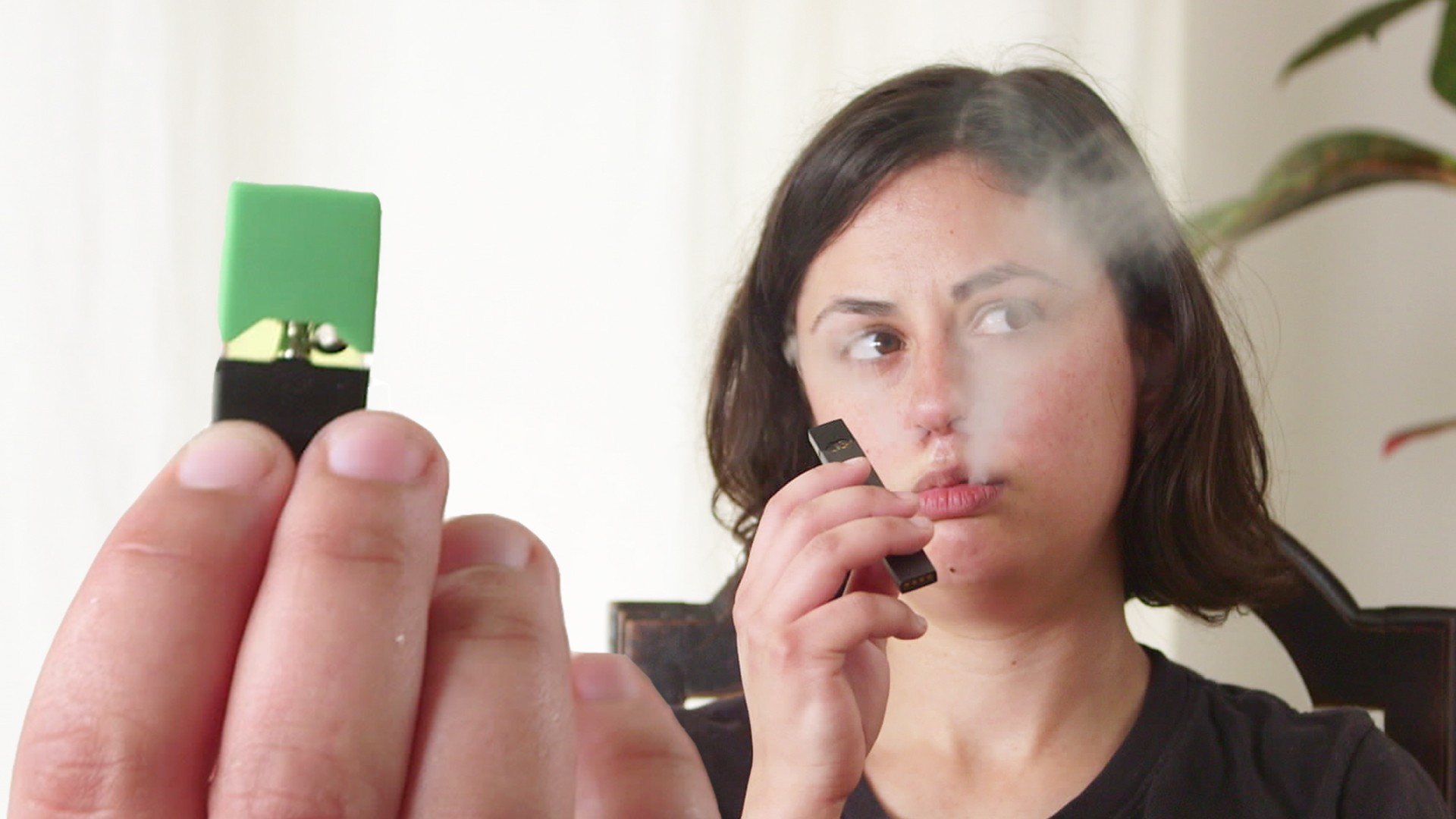Image by Lia Kantrowitz. Includes a Juul Labs e-cig photo by Gabby Jones/Bloomberg via Getty Images
It's a tale of two JUULs.Last month, San Francisco became the first city in the country to prohibit the sale of e-cigarettes. Though it would take about seven months for the policy to go into effect, it initially looked like a done deal in a city with a history of progressive legislation.But it's more complicated than that.

By the time the anti-vaping bill was passed into law, JUUL Labs—the vape powerhouse headquartered in San Francisco—had already put its own plans in motion, bankrolling an initiative called the Coalition for Reasonable Vaping Regulation to combat it. On Wednesday, the San Francisco Department of Elections certified that the Coalition and its allies had collected enough signatures to place the measure on the ballot in November, when the so-called "e-cig ban" could be overturned.The reason city and state governments have taken to regulating vaping in fits and starts—banning it indoors in some cases, for instance—is that the FDA in 2017 proposed allowing e-cigarettes to remain on sale until at least 2022 as it decided how to handle them nationally. (A pending federal court ruling may accelerate that timeline.) The side of this you fall on more or less comes down to who you believe purveyors like JUUL, which has historically controlled well over half the e-cig market, are actually targeting. Are they after adult smokers trying to get off cigarettes and searching for an alternative, like vaping, to accomplish that? Or is the company seeking out teenagers and other young people who have never smoked before and see JUUL as a fresh, technologically savvy way to get a nicotine rush—or just do something that looks cool on social media?The fight in San Francisco is forcing everyone from regulators to vape purveyors to elected officials to answer that question—and quickly. It's also raising complicated questions about traditionally progressive rallying cries like harm reduction, serving as a showcase for what performatively woke lobbying looks like in 2019.Even as it has declined to take them off the market, the FDA has declared vaping by young people to be an "epidemic," and taken some steps to challenge it. Last October, the agency seized thousands of documents from JUUL offices in the hopes of figuring just how purposefully the company might be going after teens. Vaping by young people has become such a dilemma in the eyes of establishment figures that one school in Nebraska, according to the New York Times, proposed randomly testing students who participate in extracurricular activities for nicotine. There is some hard data behind the concern: Politico cited surveys showing "vaping among high school seniors nearly doubled from 2017 to 2018, to 21 percent." JUUL has responded to FDA scrutiny in part by agreeing not to sell fruity, potentially youth-attractive flavors (such as mango) to brick-and-mortar stores.Advocates of overturning San Francisco's ban insist that they aren't blind to those problems."No one is hiding the fact that JUUL is a leader in our coalition, and it makes perfect sense to me that they are," said Nate Allbee, the spokesperson for the Coalition for Reasonable Vaping Regulation, who repeatedly emphasized that nonsmokers should never start vaping. "There was no organized political movement around vapers until now. We're coming together, and it's interesting: I spent my entire career working against big companies, but, in this case, harm reduction is harm reduction."Harm reduction is traditionally used to refer to rational drug policy like needle exchanges or medication-assisted treatment (MAT) for people struggling with opioid problems. But JUUL is not FDA approved, and some e-cig critics place more blame on the government agency than the vaping company itself. Before he resigned in April, FDA Commissioner Scott Gotleib came under fire for giving companies like JUUL too much latitude to operate prior to winning their blessing. (As Vox reported, Gottlieb suggested he did not want to risk cutting off access to alternatives to traditional cigarettes that might be significantly less dangerous, among other reasons.) He was replaced by Norman E. "Ned" Sharpless as acting commissioner, who signaled he planned to continue cracking down on potential targeting of young people by vape companies, but did not immediately change the long-term approval plan."We are working on a comprehensive application to demonstrate the potential public health impact of JUUL products, including the unprecedented rate at which our products are switching adult smokers from combustible use, which will be reviewed by FDA technical and scientific experts," Theodore Kwong, a spokesperson for JUUL Labs, said in an email statement when asked about progress.The timeline for that, though, remains unclear. Thus the attempt at prohibition—a conscious move by San Francisco officials to make the feds hurry up already."I don't think 'ban' is an accurate description of what San Francisco has done," said John Coté, a spokesperson for San Francisco's city attorney, who co-authored the anti-vaping measure. "This legislation is simply a sales moratorium until the FDA review that is required by law is conducted. If JUUL submits its products to the FDA and passes the review, they can sell those products in San Francisco, simple as that."Interestingly, the editorial boards of major California newspapers have come out against the moratorium. "Not only is it bad public policy to outlaw a legal product that's widely available just outside the city's borders, but it's bad public health policy to come down harder on the lesser of two tobacco evils," wrote the Los Angeles Times. Likewise, health experts such as Neal Benowitz, a professor in the School of Medicine at the University of California, San Francisco, have argued that for a longtime smoker who transitions to e-cigarettes, and substitutes it as part of daily use, vaping has been proven to "substantially increase quit rates," as he put it in an interview. On the other hand, some studies have suggested e-cigarettes release plenty of carcinogenic chemicals of their own—and might even do more harm than good.JUUL has also been pilloried for borrowing marketing techniques (and cash) from Big Tobacco. In the Atlantic, Annika Neklason pointed out how the public-relations strategy the company has employed appears to be ripped right out of a familiar playbook: As she wrote, despite evidence to the contrary in the late 19th and 20th centuries, "tobacco companies marketed cigarettes as health products." On top of this, Altria, the parent company of Phillip Morris and others, and a name perhaps most synonymous with tobacco, purchased a 35 percent stake in JUUL last December. (That deal valued the company at about $35 billion.) JUUL Labs has also bolstered its lobbying arm in D.C., spending $750,000 in the final months of 2018, according to NPR, and even hiring traditionally progressive political types like former NAACP head Ben Jealous as part of a campaign to frame access to JUUL as a criminal justice issue, as the Daily Beast reported.That JUUL is throwing around major money in D.C. probably shouldn't come as a surprise: The people—young or otherwise—who use it appear to be wealthier than past smokers, even past e-cig users."With JUUL, it seems like the demographics might be different," said Benowitz. In the past, with other e-cigarettes, users had been smokers already, or were at risk to become smokers, meaning they tended to live in poverty and be relatively uneducated, he said. "Now, it appears the kids using JUUL can be more affluent and who have no interest in becoming cigarette smokers. So I think we're less concerned now about this being a gateway to cigarettes than it is being a primary nicotine addiction."In other words, we are in pretty uncharted territory here—smack in the middle of a conflict between long-term smokers who tend to be, as Benowitz said, from more vulnerable areas, and rich, suburban teens who might have never dabbled with nicotine in the first place. Throw in a bunch of lobbying cash and the language of resistance to the War on Drugs and, well, you've got a bit of a political mess—one that could distract from the simple health issue at hand."What we don't know is what the long-term consequences are," Benowitz said of vaping. "If you look back about three or four years ago, kids were mostly using mods and doing cloud-chasing, and that totally vanished. So a lot of that was a fad. We don't know if JUULing is going to be a fad like that, or if it's going to be something persistent."Sign up for our newsletter to get the best of VICE delivered to your inbox daily.Follow Alex Norcia on Twitter.

By the time the anti-vaping bill was passed into law, JUUL Labs—the vape powerhouse headquartered in San Francisco—had already put its own plans in motion, bankrolling an initiative called the Coalition for Reasonable Vaping Regulation to combat it. On Wednesday, the San Francisco Department of Elections certified that the Coalition and its allies had collected enough signatures to place the measure on the ballot in November, when the so-called "e-cig ban" could be overturned.
Advertisement
Advertisement
Advertisement
Advertisement
